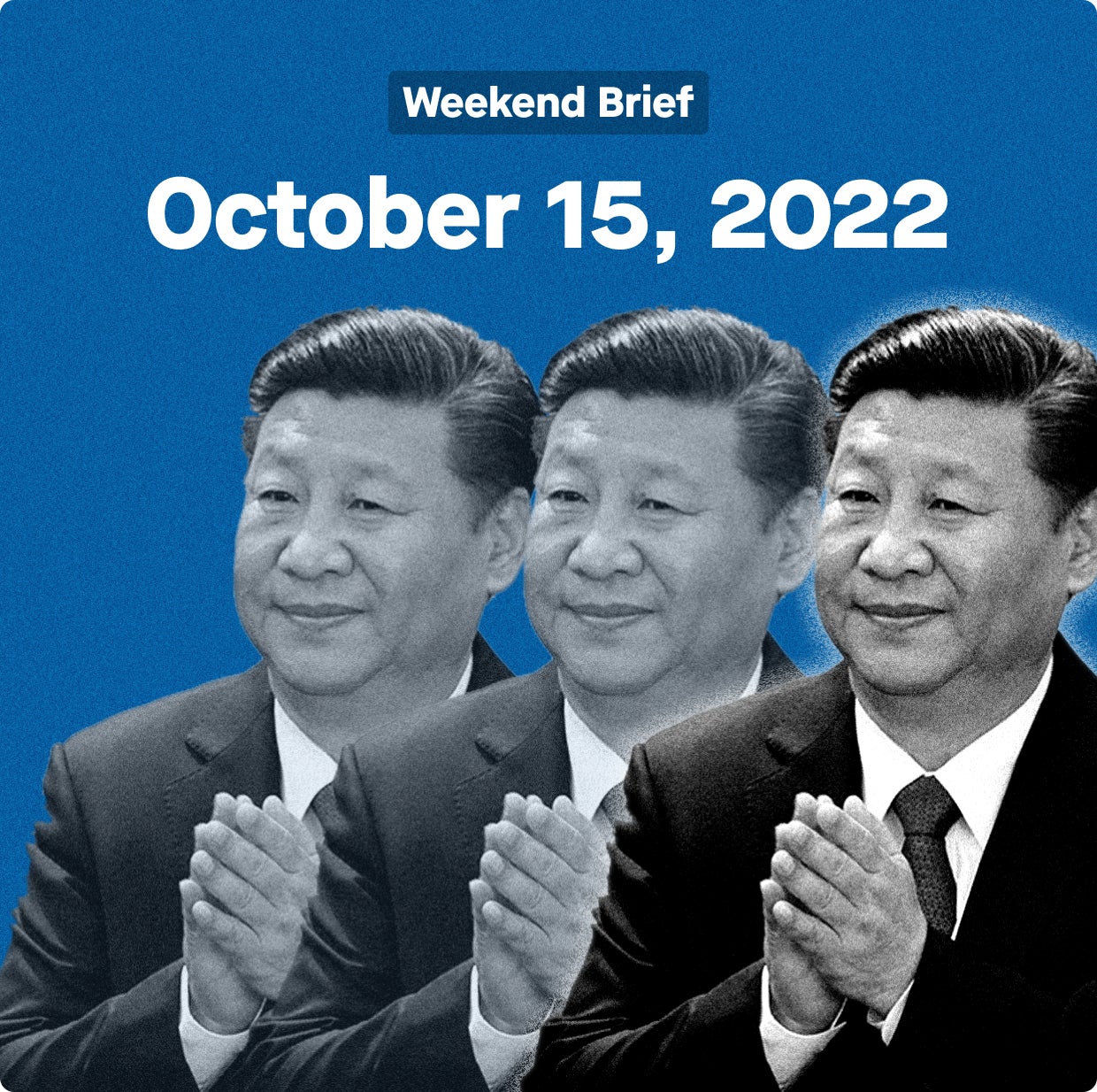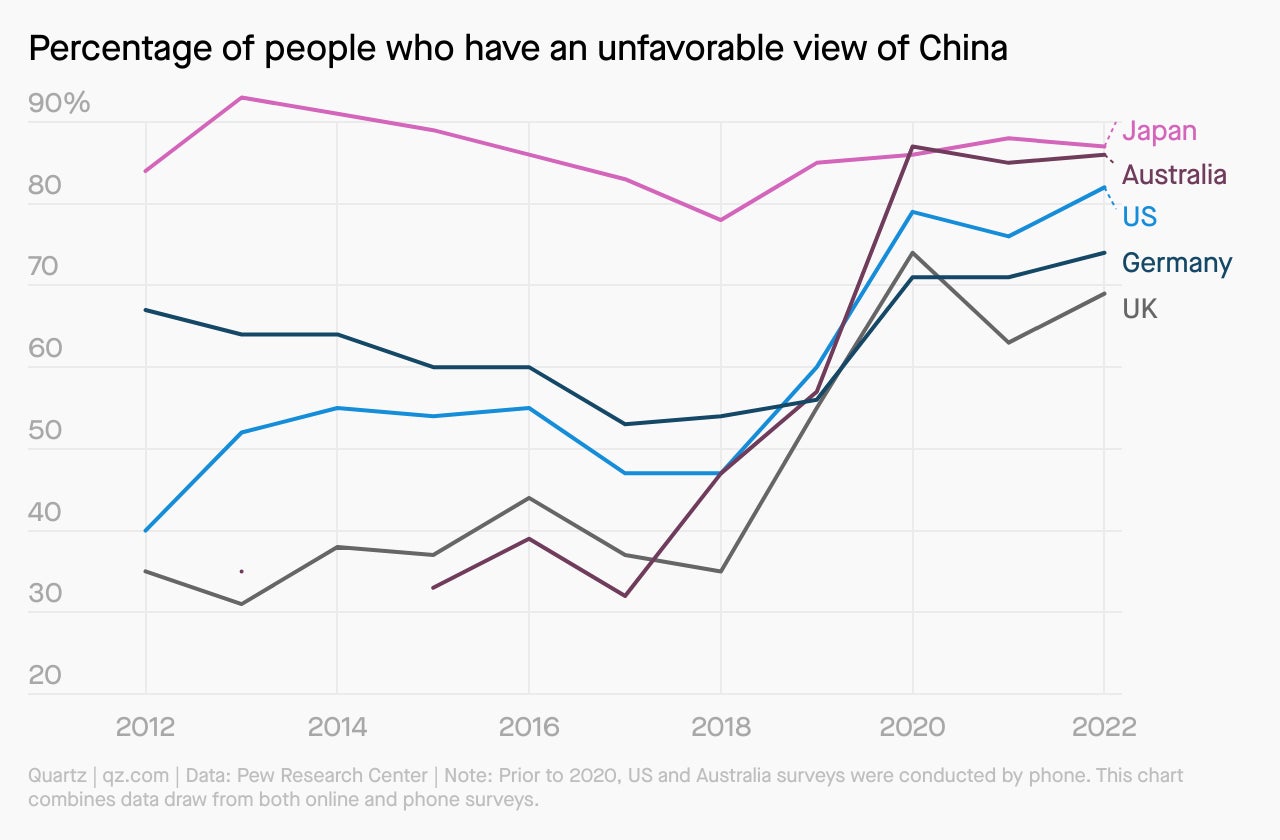Xi Jinping: Here comes treble
What will Xi Jinping's unprecedented third term as president mean for China and the world?


Hi Quartz members,
On Sunday (Oct. 16), more than 2,000 delegates of the Chinese Communist Party (CCP) will convene in the Great Hall of the People in Beijing, for the party’s five-yearly congress. It will be a historic event, because Xi Jinping, China’s president since 2012, will in all likelihood secure an unprecedented third term as the party’s chief.
In his decade in power, Xi has deeply altered the country. China is more belligerent and assertive on the world stage. An intensifying technological competition with the US, putting the world’s two largest economies at strategic loggerheads, colors much of Beijing’s policymaking and geopolitical relations. Of late, tensions over Taiwan have escalated, prompting worries of some kind of economic or hot war.
At home, citizens are under ever-stricter state surveillance. The government has sharpened its all-encompassing campaign of repression against Uyghurs in the Xinjiang region. A massive national security complex is under construction to consolidate the state’s hold on Hong Kong. China is also entrenching its infrastructure of social control with the help of zero-covid policies.
Yet as the CCP has sought to cement complete control over all aspects of political, social, and economic life, it has also grown more anxious in the face of what Xi calls “great changes unseen in a century.” These changes—geopolitical, economic, demographic, cultural—present both threats and opportunities. Xi is determined to steer China through them and to emerge on the other side having remade the global order in its own authoritarian image.
If Xi wins his third term, as seems likely, it will keep him at the helm of the party and the military. His state position as president will be confirmed at an annual government meeting next spring. He may even add another feather to his cap: a new official moniker like “people’s leader,” or the Mao-era post of “chairman.”
Whatever his latest set of titles may be, Xi will find himself contending with global leaders far more seasoned and clear-eyed about transacting and competing with China than they were a decade ago. In fact, Xi’s attempts to stay one step ahead of “great changes” has accelerated those very changes. Volatility will likely be a constant, and the CCP’s coveted stability may yet prove elusive—Xi notwithstanding.
TALKING THE TALK
China loves its jargon, and plenty of it will appear in the party congress’s work report, which Xi will deliver as he lays out policy priorities. Use our brief glossary to understand the knottiest of terms du jour:
- “Two Establishes”: This phrase “is essentially a giftbox of loyalty to Xi, establishing him as 1) the unquestionable ‘core’ leader of the CCP, and 2) his ideas as the bedrock of China’s future under the CCP,” explains China Media Project, a research program at the University of Hong Kong.
- “Balance development and security”: Instead of presenting economic development as a “top priority,” as every party congress has done since 2002, Xi may use this phrase instead, says Howard Wang of RAND Corporation, suggesting that Beijing may be prepared to stomach still more economic pain to achieve its political goals.
- “Self-reliance”: As a matter of economic security, China wants to be less dependent on foreign imports of critical components and materials used in strategic sectors. The effort to shore up China’s self-sufficiency has been years in the making, with mixed results, but is seen as increasingly urgent as China’s relations with the West worsen.
- “Lying flat”: This week, People’s Daily, the CCP mouthpiece, published at least three consecutive articles defending the country’s stringent zero-covid policies. Having appropriated the phrase “lying flat” from a niche Gen Z meme, party officials now use it as a blunt rhetorical device to condemn any easing of pandemic restrictions.
TRENDING NEGATIVE
Unfavorable views of China have risen sharply worldwide since Xi took power in 2012, according to survey data from the Pew Research Center. In many economically advanced countries, such views hit historic highs this year.
10-40 million: The estimated number of people in China under some form of covid lockdown at any point in August
10.76 million: The number of Chinese college graduates entering the job market this year, at a time when youth unemployment is already at…
19.9%: The proportion of 16-to-24-year-olds who are out of a job
1.3% Year-on-year decline in China’s house prices in August, the steepest drop in seven years
ONE🕰️THING
The party congress this year is scheduled to last a week, which is par for the course as far as these events go. In 1945, though, the congress—the party’s seventh—ran for 49 days. China was at war with Japan, and Beijing wasn’t safe, so more than 700 delegates traveled to Yen’an, closer to the country’s centre, to ordain Mao as the party’s all-powerful chief. “The proscenium arch bore the slogan in large Chinese characters meaning ‘March forward under the banner of Mao Zedong,’” the journalist Richard Bernstein wrote in his book China 1945. During the congress, Mao delivered nine speeches; the longest, Bernstein wrote, was “a nearly book-length text that must have taken hours to read aloud.” No wonder the congress lasted 49 days
QUARTZ STORIES TO SPARK CONVERSATION
- Workplaces serious about normalizing pregnancy should also be normalizing menopause
- In Neom, Western executives have found their LIV golf league
- The future of K-pop superstars BTS takes center stage in South Korea’s conscription debate
- The US’s estimate for uptake of the new covid booster was off by more than 90%
- What happened when NASA smashed into that asteroid
- Can SoftBank convince more restaurants to use robots?
5 GREAT STORIES FROM ELSEWHERE
🇨🇳 Xi Jinping, rule-breaker. If Xi Jinping secures his third term, he will be transgressing an unwritten rule: retire at the age of 68. It isn’t the only rule Xi has broken in the past decade. In a data-rich analysis of the CCP and its various heavy-hitters and hierarchies, Bloomberg charts the way Xi has remade the CCP to cement his hold on power.
⚽ The prank that stuck. When he was a teenager, Kieran Morris and a friend tinkered with an obscure Honduran soccer player’s Wikipedia page, inflating his numbers and dubbing him the “Honduran Maradona.” They laughed themselves sick over their private joke. Then a US club signed the player for $212,000 a year. “Had they done that?” the friends wondered. In the Guardian, Morris sets out to discover if their joke had gone too far.
🎞️ Hollywood trash. For long, the kind of movie that defined Hollywood was not The Godfather but Nuts, a Barbara Streisand film about a Manhattan prostitute who murders a client. Or so Wesley Morris argues in the New York Times Magazine, in a piece that, he writes, is “a jeremiad against good taste and Hollywood conservatism.” Where did such trash go, though? It formed a crucial pleasure node of the cinema, but Morris thinks it is vanishing fast.
✈ ️The not-so-great escape. In the summer of 2021, as the Taliban retook Afghanistan, a bunch of refugees arriving in the US found an unexpected source of help: AJ Subat, a 36-year-old musician and Lyft driver in Orange County. Subat helped them settle into hotels and Airbnbs, outside the refugee camps where others remained. But then, as New York recounts, it started to seem as if Subat had bitten off much more than he could chew.
🖼️ C is for copy. You, a Keith Haring fan, go on Etsy. You spot a vintage print “hand-signed” by Haring, at a price that seems very reasonable for such an artefact. You buy, of course. But the Internet and high-resolution printing have sparked a boom in spurious art online, writers Hyperallergic. Exhibition posters are printed in violation of copyright. Art show catalog pages masquerade as prints. Paintings on eBay are straight-up fake. What is a collector to do?
Thanks for reading! And don’t hesitate to reach out with comments, questions, or topics you want to know more about.
Have a weekend free of long speeches,
— Mary Hui, geopolitics, tech, and business reporter
Additional contributions by Julia Malleck, Alex Citrin-Safadi, and Samanth Subramanian
